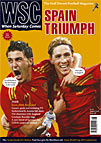 He's a big name, but Chelsea's new manager has fallen one step shorter of glory each time with Portugal and Luiz Felipe Scolari's critics are well stocked with ammunition, as Phil Town reports
He's a big name, but Chelsea's new manager has fallen one step shorter of glory each time with Portugal and Luiz Felipe Scolari's critics are well stocked with ammunition, as Phil Town reports
Third time lucky, then, for Luiz Felipe Scolari: courted by Benfica at the time of Euro 2004 and by England at the last World Cup, now Chelsea’s riches have lured him away from the Selecção. But Blues fans may wish to study closely Felipão’s final report card, after his five-and-a-half years as Portugal’s Seleccionador.
Portuguese FA president Gilberto Madaíl recently set out the main requirement for Scolari’s successor: he must speak Portuguese. One columnist in sports daily A Bola suggested that actually a knowledge of tactics may also be a good idea.
Because for all his qualities, this is one major criticism levelled at Scolari: when it came to the crunch (against Greece in 2004, against France in 2006, against Germany this time around), Portugal just did not have the organisation and flexibility to deal with opponents who had done their homework and were clinical in the execution of their game plans. Meanwhile, the Sargentão’s main gambit appeared to be huddles and dependence upon his favourite Catholic symbol, Nossa Senhora da Caravaggio, for luck. Not enough, however, to deal with Schweinsteiger free-kicks delivered into the heart of a defence who had apparently never seen such a thing.
Add to this the highly questionable selection of players in some positions and you have a ready recipe for failure. This included Petit in midfield, after a season of injury and underperforming at Benfica, all-at-sea Paulo Ferreira converted to left-back, with qualification stalwart Marco Caneira left at home, and Ricardo in goal, with his now legendary flapping at crosses and fresh from a stinker of a season at Betis.
Faith in his favourites earned Scolari unquestioning loyalty from players, but it blinded him to other possibilities: apart from one or two question marks, he had his squad in mind months in advance, players’ form and fitness seemingly of secondary importance to the group dynamic. He rarely went to see games, preferring the sofa and reports from assistants.
But there was that one thing that he was able to do: create a family spirit – the paternalistic figurehead and his meninos. After the ramshackle affair that was the 2002 World Cup under António Oliveira, Scolari’s shepherding of the rabble into a squad that could reach the final of Euro 2004 was nothing short of a minor miracle.
Euro 2004 also saw an explosion of nationalistic fervour in Portugal; yes, because the tournament was played here, but also because of a mass response to Scolari’s populist discourse. Flag manufacturers had never had it so good, with windows, verandas and cars up and down the country draped in red and green. Four years later, Portuguese emigrants were buying black-market tickets for sold-out training sessions in Neuchâtel at ten times their face value.
This will be one of Scolari’s great legacies – the approximation of the people to their Selecção. On discussion boards, it is the main factor cited in the Brazilian’s defence. Nevertheless, opinion is overwhelmingly critical. Many feel he treated his time in Portugal as something of a holiday and an opportunity to line his pockets; his substantial salary was supplemented with lucrative advertising contracts, now the subject of an investigation by the tax authorities.
His lack of tactical nous is held up as the reason for Portugal not doing better in the past three tournaments, coming up shorter each time: from finalist in 2004, to semi-finalist in 2006, to quarter-finalist now – an “almost man”, in fact (like Avram Grant). And his stubbornness, especially in terms of selection, still has the country divided: Porto fans will never, for example, forgive the exclusion of Vítor Baía in 2003-04 in favour of Ricardo, a case study in obstinacy on a par with Romário’s exclusion from the Brazil squad in 2002. One visitor to the website Maisfutebol’s discussion board commented: “I’d like to remind him that there isn’t a dictatorship in Portugal any more… and that being flexible and recognising your mistakes is a virtue.”
As for his relationship with the media, it was rocky at best. His manner at press conferences was invariably an uncomfortable mixture of arrogant, supercilious and defensive; in Switzerland, his monosyllabic responses to questions about the timing of the announcement of the Chelsea appointment struck all the wrong notes but were, frankly, par for the course.
Psychologist Regina Brandão, who has worked with Scolari for ten years, told the free weekly newspaper Sexta: “Felipão can’t treat the English as he did the Portuguese.” It seems clear that Scolari will have to change many of his ways in the demanding Premier League. Oh, and learn English. And quickly.
From WSC 258 August 2008